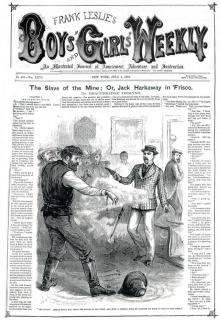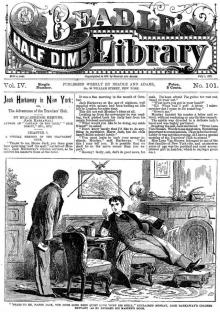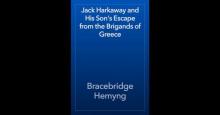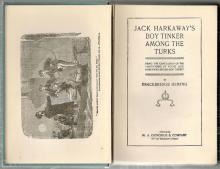- Home
- Bracebridge Hemyng
Jack Harkaway's Boy Tinker Among The Turks Page 5
Jack Harkaway's Boy Tinker Among The Turks Read online
Page 5
CHAPTER LXIII.
THE ORPHAN IS PRESENTED AT COURT--IS A BIT NERVOUS--LESSONS IN THETURKISH LANGUAGE--MANNERS AND CUSTOMS--THE PASHA OF MANY WIVES--ANOFFICIAL PRESENT--BOWSTRINGING--AN EXECUTION--HORROR! THE ORPHAN'SPERIL, AND WHAT CAME OF IT.
Having got Chivey and his master together again, we now travel to theTurkish coast to be in the company of young Jack and his friends.
The orphan had been roused from his slumbers to be presented to thepasha of that province.
His excellency the pasha had done them the honour to pay them a visitof ceremony on board ship, and was seated in great state surrounded byhis suite in the best saloon.
After the chief personages on board had been presented, his excellencyhad, according to Captain Deering, desired to see that distinguishedpersonage, Mr. Figgins, _alias_ the orphan.
And now the orphan stood trembling outside the door of the saloon.
"In you go, Mr. Figgins," whispered Captain Deering.
"One moment."
"Nonsense."
"Just a word."
"Bah!" said the captain, with a grin; "you aren't going to have a toothout. In with you."
He opened the door, gave the timorous orphan a vigorous drive behind,and Mr. Figgins stood in the august presence.
The pasha was seated--it would be irreverent to say squatted, whichwould better express it--upon a cushion that was, as Paddy says,hanging up on the floor.
His excellency was in that peculiar, not to say painful attitude, whichless agile mortals find unattainable, but which appears to mean truerest to Turk or tailor.
The pasha rejoiced in a beard of enormous dimensions, a grizzleddirt-coloured beard that almost touched the cushion upon which he sat.
A turban of red and gold silk was upon his venerable head.
And beside his excellency upon a cushion were laid his arms, weapons ofbarbarous make, thought the orphan.
A scimitar, curved _a la_ Saladin, two long-barrelled pistols, withjewelled butts, "as though they were earrings or bracelets," the orphansaid to himself, a long dagger with an ivory hilt and sheath, and apiece of cord.
"That's to tie them together with," mentally decided the orphan. "Onemight as well travel with the Woolwich Arsenal or the armoury from theTower. Barbarous old beast."
"Now," said Captain Deering, "tuck in your tuppenny, Mr. Figgins; bowas low as you can."
The orphan put his back into an angle of forty-five with his legs.
"Lower."
"Ugh!"
"A little bit more."
"Lower," said Captain Deering, in an agonised whisper. "We shall all bebowstrung if his excellency thinks us wanting in respect."
The orphan thus admonished made a further effort, and over he went
Head first!
There was such a chattering, such horrible sounds going on, as CaptainDeering scrambled after the unfortunate orphan, that the latter thoughthis time was come.
The captain dragged him to his feet, however.
Then the presentation was proceeded with.
"His Excellency Ali Kungham Ben Nardbake," cried a dignitary standingbeside the pasha, with a voice like a toastmaster.
"Good gracious me!" exclaimed the orphan, "all that?"
"That's not half of it," said Captain Deering. "To the faithful, he isknown as well as Sid Ney Ali Ben Lesters puar Nasr ed Bowstrung andStrattford Bustum."
Mr. Figgins was greatly alarmed at this.
"Powerful memories his godfathers and godmothers must have had," hemurmured.
Beside the pasha stood an official, with a beard of extraordinarylength.
"Who's that?"
"Hush?" whispered Deering; "don't speak so loud."
"Who is he?" again asked the orphan, sinking his voice.
"The one with the beard?"
"Yes."
"His name is Whiska Said Mahmoud Ben Ross Latreille," returned Deering.
"Dear, dear!" murmured the orphan, in despairing accents, "I shallnever----"
"Ease her, stop her!" cried a familiar voice in Mr. Figgins's ear,"you've got it in a knot."
It was Nat Cringle.
All was hushed.
The bearded official looked at the pasha, who nodded.
Then drawing his sword, he signed to two of his men, and Nat Cringle,looking dreadfully frightened, was bustled off behind a curtain whichhad been rigged up across the saloon, just at the pasha's back.
"What are they going to do?" asked the orphan, his teeth chattering inalarm.
Captain Deering was so much affected at this stage of the proceedingsthat he covered his face with his pocket-handkerchief.
"Poor Nat!"
"What is it?" faltered Mr. Figgins, faintly.
"Did you not see the cord taken away with Nat?" demanded the captain,in a funereal bass.
"Ye-es."
"Then hark."
Mr. Figgins did hark, and an awful sound reached him from behind thecurtain.
It was more like the expiring groans of a hapless porker in the handsof a ruthless butcher, than any thing else you could compare it to.
A fatal struggle was going on behind the curtain.
Groans and dying wails were heard for awhile.
Awful sounds.
Then all was still.
"Oh, what is it?" murmured the orphan, in distress.
"Squiziz Wizen, the pasha's executioner, has dealt upon poor NatCringle."
"What!" gasped Figgins.
"Bowstrung," returned Captain Deering.
The orphan turned faint.
Then he turned to the door, and would have fled.
"Oh, let me go home," he cried. "I don't feel happy here."
But Deering stayed him.
"You must not go, Mr. Figgins," whispered Captain Deering.
"Why not?"
"His excellency is about to address us."
The pasha coughed.
"_Quel est votre jeu?_" demanded his excellency.
"What does he say?" asked Figgins.
"Batta pudn," continued his excellency, with a gracious air; "also bonoJonni."
"He says you may present whatever you have brought," whispered thecaptain.
"I've brought nothing," returned Mr. Figgins.
"Nothing?"
"No; I forgot."
"Thoughtless man," said Captain Deering. "Take this."
He thrust a parcel of brown paper into his hands.
"What shall I do with it?"
"Place it on the cushion before his excellency."
Mr. Figgins complied.
"Luciousosity," said the pasha, looking upon the offering greedily.
Then he clapped his hands vigorously three times.
The minister appeared, leading two veiled ladies.
The pasha made some remarks in his own language, which Captain Deeringwas commissioned to render into English.
"His excellency, recognising your generous offering," said he,"presents you with the choicest gifts of his seraglio, two wives. Youmust cherish them through life."
The orphan's countenance fell at this.
The capital punishment of poor Nat Cringle was as nothing to this.
"Tell him I'd rather not take two," he whispered to Deering.
"Why not?" ejaculated the latter.
"I wish to live single."
The bearded minister approached, leading the two veiled beauties.
"Oh! oh, dear," groaned the poor orphan.
He placed a gloved hand of each upon Mr. Figgins's shoulders.
Then, upon a given signal, they threw their arms around the orphan andhugged him, while a violent cachinnation was heard.
"What a lovely smile," said Captain Deering. "Did you hear it?"
"Oh! Please don't," cried the orphan.
He struggled to get free.
But the beauties of the seraglio held him tight.
The orphan grew desperate, and jerked himself out of their clutches.
But in the tussle down he
flopped on the ground again.
"Infidel dog!" roared the pasha, venting his wrath in English,"barbarian and idolater, thou shalt die!"
Thereupon, Captain Deering dropped down beside the orphan, and sued formercy.
"Be merciful, O great prince!" he cried. "Have pity on your humblestslave. His heart is filled with gratitude."
The pasha growled some reply that was indistinct, but which to thestartled Figgins, sounded like the rumbling of distant thunder.
"Oh, what shall I do?" moaned the orphan. "Oh, somebody take me home."
"Silence," whispered Captain Deering. "Prostrate yourself as they do.Bury your face and be silent, until his excellency bids you rise. Hemay then overlook it."
Mr. Figgins scarce dared to breathe.
There he lay, with his face upon the ground, humbly awaiting the sterndespot's permission to move.
* * * *
He waited long--very long.
While he waited thus, a strange commotion was observed amongst thepasha's suite.
The chief officer removed his turban and beard, and--wonderful torelate!--beneath it was the laughing face of Harry Girdwood.
He winked at his august master, who hurriedly removed his turban andbeard as well.
And then the pasha bore a marvellous resemblance to Jack Harkaway theyounger.
They helped to drag off each other's robes--for beneath their Turkishgarments were their everyday clothes.
The veiled beauties of the harem were disrobed.
Beneath their veils and feminine attire they were familiarly garbed,and a glance revealed them to be Tinker and his body-guard Bogey.
"Now then, Mr. Figgins," said Nat Cringle, "wake up."
The orphan looked up in amazement at the sound.
"Nat Cringle!"
"Hullo!"
Mr. Figgins looked about in wonderment.
Facing him was Jack Harkaway, sitting upon a camp stool, and beside himstood his constant companion, Harry Girdwood.
Engaged in conversation with them was Captain Deering, and the subjectof their conversation appeared to be the orphan himself.
The Turkish soldiers and people generally forming the pasha's suite haddisappeared, and in their places were several sailors, some of whomappeared to be considerably amused at something.
When Mr. Figgins sat up and looked about him, he muttered--
"What's all this?"
"A very serious case, Harry," said Jack, gravely.
"Very."
"A case for the doctor."
"What do you mean?"
"These habits of drinking grow upon one," said Harry Girdwood, sadly.
"I don't understand," faltered the orphan.
"Shall we help you to bed, sir?" asked one of the sailorscompassionately.
"Never!" cried Mr. Figgins, with majesty.
"Oh, yes, do," said Harry.
But nerved to desperation, the orphan tore himself away from them, anddarted to the door.
"I shall go and report upon these outrageous doings to the captain ofthe ship," he said, drawing himself up.
"Here's the captain himself," said a good-natured voice behind him."And now, what can he do for you, Mr. Figgins?"
The orphan turned.
There was the captain.
"Mr. Figgins," said the captain, with a serious air, and shaking hisforefinger at him, "you have been indulging very early in the day."
"What?"
He could endure no more.
With a cry of disgust, he dashed past the captain, and scrambled up thestairs on deck.
Once there, he shot like a race horse along the deck, and gaining hisown berth, he locked himself in.
But even here he could not shut out the ringing laughter of theincorrigible practical jokers.
Mr. Figgins, as you may guess, was seen no more that day.
* * * *
Upon the day following the events just related, Jack received lettersfrom home.
And among them was one which created no little excitement amongst thenearest friends of Jack Harkaway.
"Do you think it probable that he'll come?"
"I shouldn't wonder," said Harry Girdwood.
"I should like to see his dear old face again," said Jack.
"I'll bet a penny that we shall see him here yet; if not here, at leastat our next stage," said Harry.
"It would be a rare treat to talk with someone who had seen our dearfolks at home."
"It would indeed. I hope he will come."
And who did they hope would come?
Can you not guess reader? No.
Then read on, and you will learn who it was and what were the reasonswhich were to bring a friend from home roaming to this distant shore tomeet Jack and his friends.

 The Slave of the Mine; or, Jack Harkaway in 'Frisco
The Slave of the Mine; or, Jack Harkaway in 'Frisco Jack Harkaway in New York; or, The Adventures of the Travelers' Club
Jack Harkaway in New York; or, The Adventures of the Travelers' Club Jack Harkaway and His Son's Escape from the Brigands of Greece
Jack Harkaway and His Son's Escape from the Brigands of Greece Jack Harkaway's Boy Tinker Among The Turks
Jack Harkaway's Boy Tinker Among The Turks